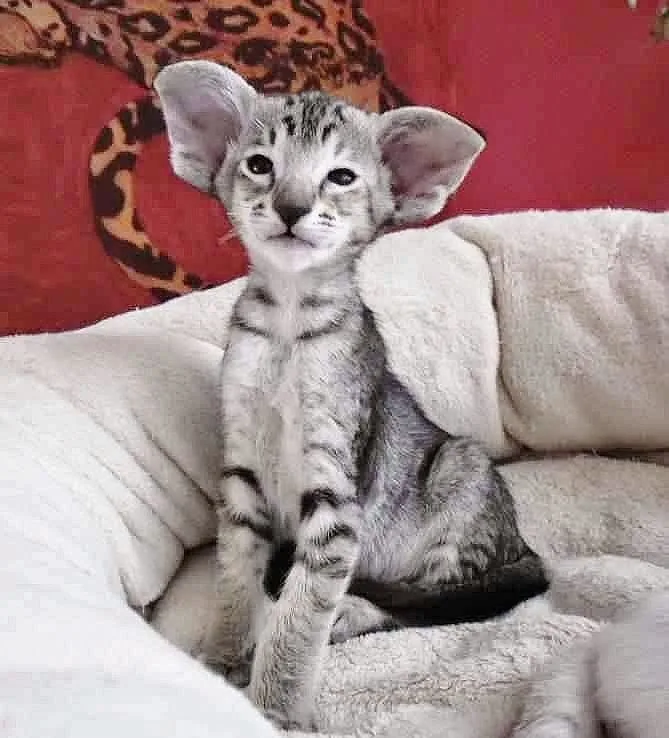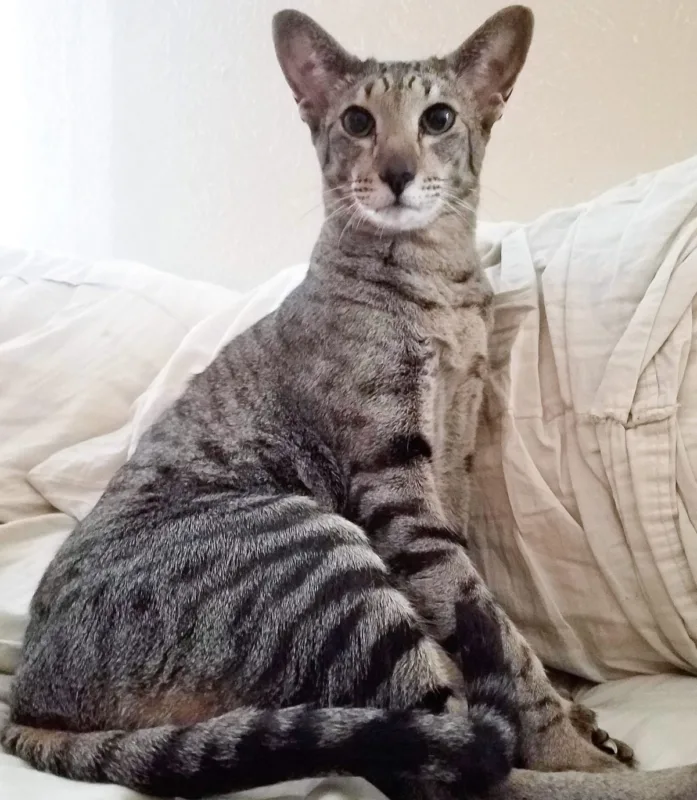Oriental Kittens: Facts and Care Guide
Oriental kittens are captivating and delightful companions known for their striking appearance and engaging personalities. Here are some important facts and a care guide to help you provide the best care for your Oriental kittens:
Facts about Oriental Kittens
- Breed Origins: Oriental kittens are descendants of Siamese cats and share many similarities in terms of their body shape, slender physique, and almond-shaped eyes. They come in a wide variety of coat colors and patterns.
- Playful and Active: Oriental kittens are highly energetic and love to play. They are curious by nature and enjoy exploring their surroundings. Providing interactive toys and engaging playtime activities will help keep them mentally stimulated and physically active.
- Intelligent and Vocal: Oriental kittens are known for their intelligence and ability to learn quickly. They are also quite vocal, often expressing their needs and desires through a range of meows, trills, and chirps.
- Social and Affectionate: Oriental kittens thrive on human companionship and enjoy being part of the family. They form strong bonds with their owners and appreciate being included in daily activities. Regular socialization and attention will help them develop into well-adjusted and loving cats.
Care Guide for Oriental Kittens
- Proper Nutrition: Provide a balanced and nutritious diet formulated specifically for kittens. Consult with your veterinarian to determine the appropriate feeding schedule and portion sizes based on your kitten’s age, weight, and activity level.
- Grooming Routine: Oriental kittens have a short and fine coat that requires minimal grooming. Regular brushing will help remove loose hair and keep their coat in good condition. Additionally, schedule periodic nail trims and dental care to maintain their overall health.
- Litter Box Training: Introduce your Oriental kitten to a clean litter box and provide litter that they are comfortable using. Show them the location of the litter box and praise them when they use it correctly. Clean the litter box regularly to ensure hygiene and prevent accidents.
- Environmental Enrichment: Create a stimulating and safe environment for your Oriental kitten. Provide scratching posts, climbing structures, and interactive toys to satisfy their natural instincts. Rotate and introduce new toys periodically to prevent boredom.
- Regular Veterinary Care: Schedule routine check-ups and vaccinations with a trusted veterinarian to ensure your Oriental kitten remains healthy. Follow their vaccination schedule, discuss parasite prevention, and address any health concerns promptly.
Remember, each Oriental kitten is unique, so observe their behavior, preferences, and health closely. Provide a loving and nurturing environment, and enjoy the companionship and joy they bring to your life.
History and Background of Oriental Cats
Oriental cats have a rich and fascinating history that traces back to their origins and development as a distinct breed. Here are some key insights into the history and background of Oriental cats:
- Origins: Oriental cats share their ancestry with Siamese cats. In the early 20th century, breeders began selectively breeding Siamese cats with different coat colors and patterns to create a broader range of variations. This led to the emergence of Oriental cats, which retained the elegant body type and distinctive personality traits of Siamese cats but displayed a wider array of coat colors and patterns.
Development as a Breed: The development of Oriental cats as a breed gained momentum in the 1950s and 1960s. Breeders aimed to preserve the Siamese-like characteristics while introducing a diverse palette of coat colors and patterns. This involved crossing Siamese cats with various other breeds, such as Russian Blues, Abyssinians, and British Shorthairs, among others, to achieve the desired traits.
Recognition and Breed Standards: The Oriental breed began receiving recognition from various cat associations in the 1970s and 1980s. Organizations like The International Cat Association (TICA), the Cat Fanciers’ Association (CFA), and others acknowledged the Oriental breed and established specific breed standards that outlined their desired characteristics, such as body type, coat, eye color, and patterns.
Variety of Colors and Patterns: One of the defining features of Oriental cats is the extensive range of coat colors and patterns they exhibit. From solid colors like black, white, chocolate, and blue to various patterns like tabby, tortoiseshell, and colorpoint (similar to Siamese cats), Orientals offer a captivating array of choices.
Personality and Temperament: Oriental cats are renowned for their intelligence, extroverted nature, and playful personalities. They are known to be vocal and will readily engage in conversations with their human companions. Orientals are highly social cats that enjoy being part of the family and thrive on attention and interaction.
Understanding the history and background of Oriental cats provides insight into their development as a unique and beloved breed. Today, these elegant and sociable felines continue to captivate cat lovers around the world with their diverse coat colors, engaging personalities, and rich heritage.
Common Health Issues of Oriental Kittens
While Oriental kittens are generally healthy and robust, like any breed, they may be prone to certain health issues. Being aware of these common health concerns can help you provide appropriate care and seek timely veterinary attention. Here are some common health issues observed in Oriental kittens:
- Dental Problems: Oriental kittens may be susceptible to dental issues such as gingivitis, periodontal disease, and tooth decay. Regular dental care, including brushing their teeth and providing appropriate chew toys, can help maintain their oral health.
- Respiratory Conditions: Oriental kittens, like their Siamese ancestors, may be more prone to respiratory conditions such as asthma and bronchial diseases. It’s important to keep their environment clean and free from irritants to minimize the risk of respiratory issues.
- Amyloidosis: Oriental cats have a genetic predisposition to develop amyloidosis, a condition where abnormal protein deposits can affect various organs, particularly the kidneys. Regular veterinary check-ups, proper nutrition, and a healthy lifestyle can help monitor and manage this condition if present.
- Congenital Heart Defects: Some Oriental kittens may be born with congenital heart defects. These can range from minor issues to more serious conditions. A thorough veterinary examination and diagnostic testing can help detect any heart abnormalities and guide appropriate treatment or management plans.
- Progressive Retinal Atrophy (PRA): PRA is an inherited eye disorder that can affect Oriental cats. It causes a gradual degeneration of the retina, leading to vision loss and eventual blindness. Genetic testing and regular eye examinations by a veterinarian can help identify and monitor any signs of PRA.
- Obesity: Oriental kittens have a tendency to gain weight if not provided with a balanced diet and regular exercise. It’s important to monitor their food intake, provide them with appropriate portion sizes, and engage them in play activities to maintain a healthy weight.
Remember, early detection and proactive veterinary care are key to addressing and managing these health issues. Regular visits to a trusted veterinarian, maintaining a healthy lifestyle, and providing a nurturing environment will contribute to the overall well-being and longevity of your Oriental kittens.
Personality and Behavior of Oriental Cats
Oriental cats are known for their engaging personalities and distinct behavior traits. Here are some key aspects of their personality and behavior that make them unique:
- Intelligence and Curiosity: Oriental cats are highly intelligent and inquisitive. They enjoy exploring their surroundings, investigating new objects, and engaging in mentally stimulating activities. Their curiosity drives them to be constantly on the lookout for new experiences and adventures.
- Playfulness and Energy: Oriental cats have a playful and active nature. They thrive on interactive playtime and enjoy games that challenge their agility and intelligence. Providing them with plenty of toys, climbing structures, and play opportunities will help them release their energy in a positive and stimulating way.
- Social and Affectionate: Orientals are social cats that form strong bonds with their human companions. They enjoy being involved in their family’s activities and seek out attention and affection. They are known to be lap cats, often curling up beside their loved ones for cuddles and companionship.
- Vocal and Expressive: Orientals are known for their vocal nature. They have a wide range of vocalizations, from soft trills and chirps to louder meows and purrs. They love to communicate with their owners and can engage in conversations, expressing their needs and desires.
- Adaptability and Flexibility: Oriental cats are adaptable and can adjust well to different environments and lifestyles. They can thrive in both single-pet households and those with other cats or even cat-friendly dogs. Their flexible nature makes them suitable for various living situations.
- Attention-seeking: Orientals enjoy being the center of attention and may actively seek it out. They love to be involved in their owner’s daily activities and may follow them around the house. They are social butterflies that thrive on human interaction and appreciate being included in daily routines.
Understanding the personality and behavior of Oriental cats allows you to create a nurturing environment that meets their social and mental needs. Providing them with love, attention, mental stimulation, and a space to express their natural curiosity will contribute to their overall happiness and well-being.
Personality and Temperament of Oriental Cats
Oriental cats possess a unique personality and temperament that sets them apart. Here are some notable characteristics that define their engaging nature:
Intelligence and Curiosity: Oriental cats are highly intelligent and curious creatures. They have a keen interest in exploring their surroundings and investigating every nook and cranny. Their inquisitive nature drives them to seek out mental stimulation and engage in interactive play.
Playfulness and Energy: Orientals are known for their playful and energetic demeanor. They have an abundance of energy and enjoy interactive games that challenge their agility and intellect. Providing them with toys, puzzles, and ample playtime helps keep them physically and mentally stimulated.
Sociability and Affection: Orientals are social cats that thrive on human companionship. They form strong bonds with their owners and enjoy being an active part of their daily lives. They are often found following their humans around the house, seeking attention, and showering their loved ones with affection.
Vocal Communication: Oriental cats are quite vocal and express themselves through various vocalizations. They possess a wide range of meows, trills, and purrs, which they use to communicate their needs, desires, and emotions. They may engage in conversations with their owners, adding a unique charm to their personality.
Adaptability and Flexibility: Orientals are adaptable cats that can adjust well to different environments and lifestyles. They are known for their easygoing nature, making them suitable for various living situations. Whether in a bustling household or a quieter setting, they are quick to adapt and make themselves at home.
Loyal and Devoted: Oriental cats are fiercely loyal to their human companions. They develop strong bonds and exhibit unwavering devotion towards their owners. Their loyalty is often expressed through their constant presence, affectionate behavior, and their desire to be an integral part of their family.
Understanding the personality and temperament of Oriental cats allows owners to create a fulfilling and enriching environment that caters to their specific needs. Engaging them in interactive play, providing mental stimulation, and showering them with love and attention are essential for fostering their well-being and happiness.




